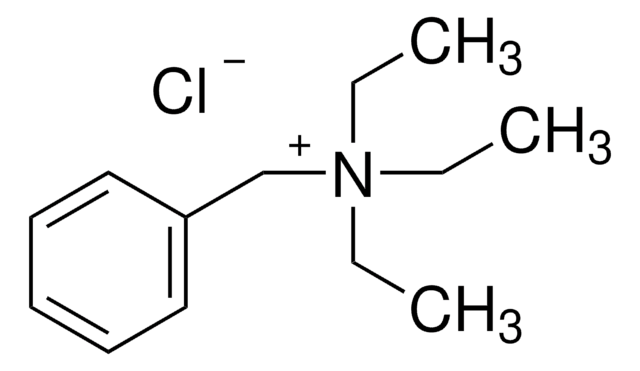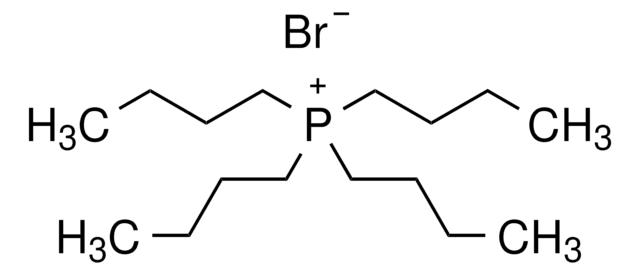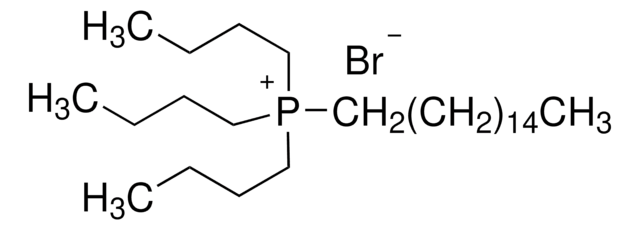218790
Tetraphenylphosphonium chloride
98%
Synonym(s):
Chlorotetraphenylphosphorane
Sign Into View Organizational & Contract Pricing
All Photos(1)
About This Item
Linear Formula:
(C6H5)4P(Cl)
CAS Number:
Molecular Weight:
374.84
Beilstein:
3922393
EC Number:
MDL number:
UNSPSC Code:
12352002
PubChem Substance ID:
NACRES:
NA.22
Recommended Products
Quality Level
Assay
98%
form
solid
mp
272-274 °C (lit.)
SMILES string
[Cl-].c1ccc(cc1)[P+](c2ccccc2)(c3ccccc3)c4ccccc4
InChI
1S/C24H20P.ClH/c1-5-13-21(14-6-1)25(22-15-7-2-8-16-22,23-17-9-3-10-18-23)24-19-11-4-12-20-24;/h1-20H;1H/q+1;/p-1
InChI key
WAGFXJQAIZNSEQ-UHFFFAOYSA-M
Looking for similar products? Visit Product Comparison Guide
Application
- Tetraphenylphosphonium chloride can be used to tune the crystallinity of CH3NH3PbI3 thin film during the deposition for boosting perovskite solar cells (PSCs) device performance.
- It reacts with organometallic anionic complexes to give the corresponding salts.
- It can also be used as arylating reagents in Pd-catalyzed Heck reaction.
Storage Class Code
11 - Combustible Solids
WGK
WGK 3
Flash Point(F)
Not applicable
Flash Point(C)
Not applicable
Personal Protective Equipment
dust mask type N95 (US), Eyeshields, Gloves
Choose from one of the most recent versions:
Already Own This Product?
Find documentation for the products that you have recently purchased in the Document Library.
Oxoperoxo molybdenum (vi) and tungsten (vi) and oxodiperoxo molybdate (vi) and tungstate (vi) complexes with 8-quinolinol: synthesis, structure and catalytic activity.
Maiti S K, et al.
New. J. Chem., 29(4), 554-563 (2005)
Efficient Perovskite Solar Cells with Reduced Photocurrent Hysteresis through Tuned Crystallinity of Hybrid Perovskite Thin Films.
Qi J, et al.
ACS Omega, 3(6), 7069-7076 (2018)
Tetraarylphosphonium Halides as Arylating Reagents in Pd?Catalyzed Heck and Cross?Coupling Reactions.
Hwang L K, et al.
Angewandte Chemie (International Edition in English), 44(38), 6166-6169 (2005)
Fedor F Severin et al.
Proceedings of the National Academy of Sciences of the United States of America, 107(2), 663-668 (2010-01-19)
A unique phenomenon of mitochondria-targeted protonophores is described. It consists in a transmembrane H(+)-conducting fatty acid cycling mediated by penetrating cations such as 10-(6'-plastoquinonyl)decyltriphenylphosphonium (SkQ1) or dodecyltriphenylphosphonium (C(12)TPP). The phenomenon has been modeled by molecular dynamics and directly proved by
Toshiaki Hattori et al.
Journal of chromatography. B, Analytical technologies in the biomedical and life sciences, 878(3-4), 477-480 (2009-12-17)
Five chitosan oligosaccharides were separated in acidic aqueous solution by capillary electrophoresis (CE) with indirect photometric detection using a positively coated capillary. Electrophoretic mobility of the chitooligosaccharides (COSs) depended on the number of monomer units in acidic aqueous solution, similar
Our team of scientists has experience in all areas of research including Life Science, Material Science, Chemical Synthesis, Chromatography, Analytical and many others.
Contact Technical Service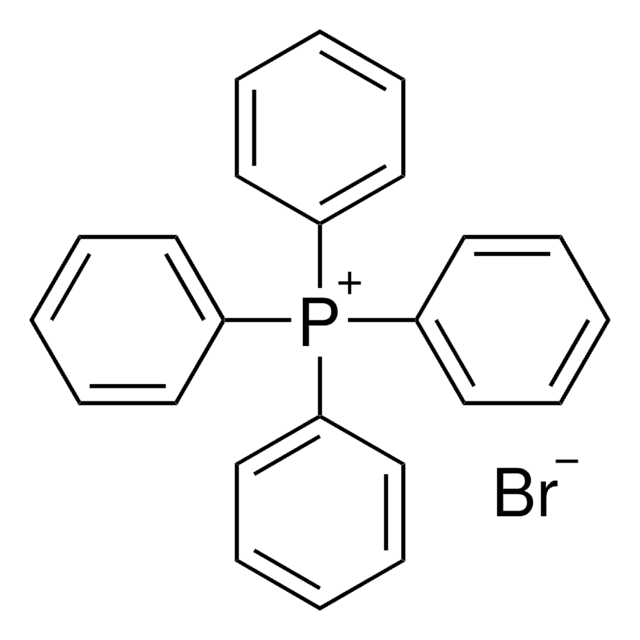

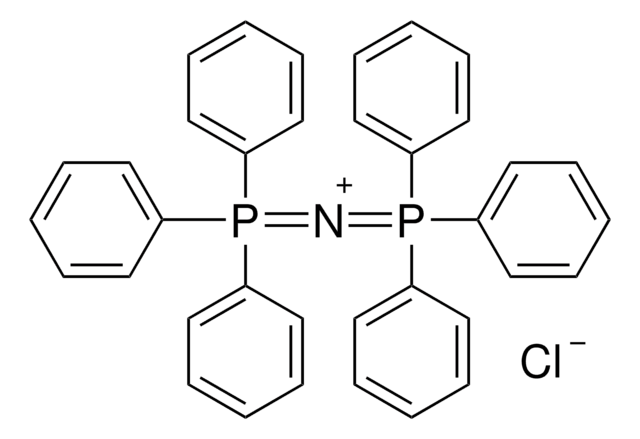
![Sodium tetrakis[3,5-bis(trifluoromethyl)phenyl]borate](/deepweb/assets/sigmaaldrich/product/structures/251/439/7a621e74-bfd1-4a43-833c-09adfcc1e0b3/640/7a621e74-bfd1-4a43-833c-09adfcc1e0b3.png)

